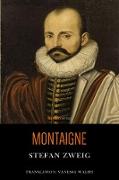"The others form the human being, I depict him; and here I present an individual who is quite poorly formed and whom I would certainly make largely differently if I had to reshape him. But now that's the way he is." This phrase from the famous essays of Michel de Montaigne outlines the character of the author and his work. Montaigne wrote his essays not from a position of certainty but from an awareness of his own inadequacy. He thus reveals a level of critical self-reflection that, before his time, was rarely put on paper. Stefan Zweig dedicated a character study to this Michel de Montaigne, the French nobleman and freethinker among the religious dogmatists and political quarrels of the 16th century.


